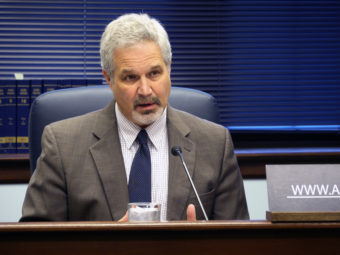Oil and gas industry advocates and Senate Finance Committee members gave a cool reception to a bill overhauling industry tax credits.
The House rewrote the bill Friday with a wide-ranging amendment that would end large companies’ ability to deduct losses from future tax bills. The amended House Bill 247 also would limit the amount of time new oil projects benefit from special tax treatment to seven years. And it would raise the minimum production tax that companies must pay from 4 percent to 5 percent when oil prices reach $70 per barrel.
But oil industry advocates say the bill would devastate the state’s economy by discouraging investment. Most industry representatives who testified during a hearing on Sunday said they want to keep the current tax system.
Armstrong Oil and Gas owner Bill Armstrong said North Slope exploration depends on the tax system. He said the bill would harm the state’s future.
“This latest version of (HB) 247 is absolutely a joke,” Armstrong said. “It’s illogical. It’s reckless. It’s irresponsible. It’ll be devastating to the state.”

House Finance Committee Co-Chairman Pete Kelly, R-Fairbanks, spoke against the bill on Saturday, saying it would discourage production. He added that the state has changed its oil and gas tax “as much as we change our underwear,” and the bill would be counterproductive.
“The changes we’re talking about making are going to make it so we have even less money,” Kelly said.
Some residents who testified during a hearing on Sunday supported the bill.
Kasilof resident George Pearce said that oil and gas taxes changed several times due to industry lobbying.
“Raise taxes on oil companies in Cook Inlet and the North Slope,” Pearce said. “Let these credits expire.”
Senate Finance Co-chairwoman Anna MacKinnon, R-Eagle River, raised concerns about the bill. But she also told oil and gas executives that the state is trying to respond to a revenue shortfall, just like the industry is.
Amendment sponsor Rep. Paul Seaton, R-Homer, said the bill would bring the state more revenue sooner, reduce long-term liabilities, and support current projects.